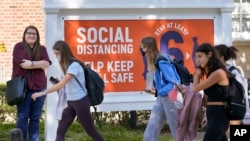When the new coronavirus began appearing in the news in January, Sarah Keeley was working as a medical document copier. She had completed her university studies in biology and was considering her future career.
By February, as the disease spread across the United States, Keeley made her decision: she would work in the field of public health.
“This is something that’s going to be necessary,” Keeley remembers thinking. “This is something I can do. This is something I’m interested in.”
In August, Keeley entered the University of Illinois at Urbana-Champaign to become an epidemiologist - someone who studies how disease spreads and can be controlled.
Public health programs in the United States have seen a sharp rise in enrollment during the continuing health crisis. As state and local public health departments struggle with reduced budgets, increasing demand and even threats to workers’ safety, a new generation is entering the field.
The Association of Schools and Programs of Public Health reports a 20-percent increase in applications to master’s in public health programs for the current school year.
Some programs are seeing even bigger jumps. Applications to Brown University’s master’s in public health program rose 75 percent, says Annie Gjelsvik. She is a professor and director of the program.
Demand was so high as the pandemic hit in the spring that Brown extended its application process by over a month. Seventy students joined the program this autumn, compared to 41 last year.
“People interested in public health are interested in solving complex problems,” Gjelsvik said. “The COVID pandemic is a complex issue that’s in the forefront every day.”
Magnolia E. Hernández is an assistant dean at Florida International University’s Robert Stempel College of Public Health and Social Work. She said new student enrollments in its master’s in public health program grew 63 percent from last year. The school has especially seen a rise in interest among Black students, from 21 percent of newly admitted students last fall to 26.8 percent this year.
Kelsie Campbell is one of them. She is part Jamaican and part British. When she heard in both the British and American media that the Black community and ethnic minorities were being especially hurt by the pandemic, she wanted to learn why.
“I want to be able to come to you and say, ‘This is happening. These are the numbers and this is what we’re going to do,’” Campbell said.
The biochemistry major at Florida International said she plans to explore that question when she begins her public health program at Stempel College in Florida in the spring. She said she hopes to one day put her public health degree to work by helping her own community.
“There’s a power in having people from your community in high places, somebody to fight for you, somebody to be your voice,” she said.
Public health students are already working on the front lines of the nation’s pandemic fight in many places. Students at Brown’s public health program, for example, are examining infection data and looking at the spread of the disease for the Rhode Island Department of Health.
Some students who had planned to work on international public health issues changed their goals as they watched the effects of COVID-19 in their own communities. Emilie Saksvig, a public health and engineering major, had planned to start working this year as a Peace Corps volunteer in Kenya. The 23-year-old had dreams of working overseas on international public health.
The pandemic forced her to cancel those plans. She decided to begin her master’s studies in public health at Emory University in the state of Georgia.
“The pandemic has made it so that it is apparent that the United States needs a lot of help, too,” she said. “It changed the direction of where I wanted to go.”
Students like Saksvig are entering a field that faced serious problems even before the pandemic.
A study by The Associated Press and Kaiser Health News found that since 2010, spending per person for state public health departments has dropped by 16 percent, and for local health departments by 18 percent. At least 38,000 state and local public health jobs have disappeared since the 2008 economic recession.
And the public health workforce is aging. Forty-two percent of governmental public health workers are over the age of 50, according to the de Beaumont Foundation. The field also has high turnover -- the rate at which people leave a field and are replaced by others. Before the pandemic, nearly half of public health workers said they planned to retire or leave their organizations for other reasons in the next five years. Low pay was among the top reasons. Some public health workers are paid so little that they receive public aid.
Brian Castrucci, is chief executive officer of the de Beaumont Foundation, which aims to support the field of public health. He said government public health jobs need to become highly sought positions for top students of public health programs.
He said, “If we aren’t going after the best and the brightest, it means that the best and the brightest aren’t protecting our nation.”
I’m Ashley Thompson.
And I'm Mario Ritter.
The Associated Press reported this story, with additional reporting from Kaiser Health News, a nonprofit news service covering health issues. Ashley Thompson adapted it for VOA Learning English. Caty Weaver was the editor.
____________________________________________________________
Words in This Story
enrollment - n. the process of entering (someone) as a member of or participant in something
application - n. a formal and usually written request for something (such as a job, admission to a school, a loan, etc.)
pandemic - n. an occurrence in which a disease spreads very quickly and affects a large number of people over a wide area or throughout the world
forefront - n. the most important part or position
dean - n. a person who is in charge of one of the parts of a university (such as a college or school)






